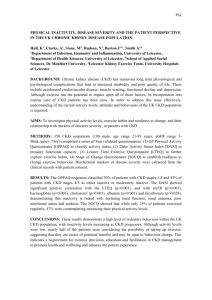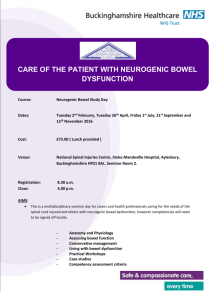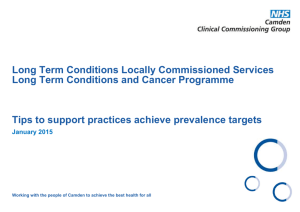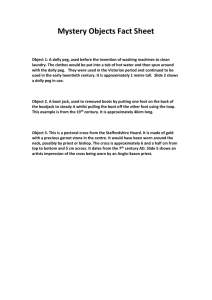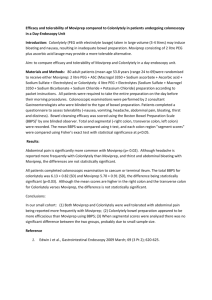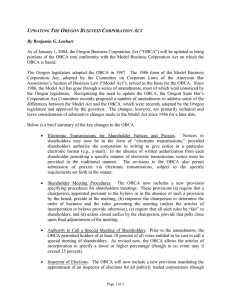Oral Bowel Cleansing Agent Prescription Checklist
advertisement
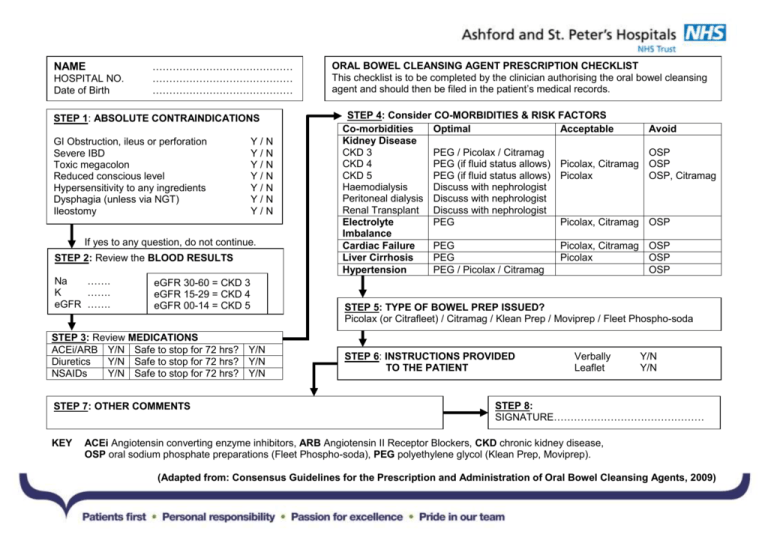
NAME HOSPITAL NO. Date of Birth …………………………………… …………………………………… …………………………………… STEP 1: ABSOLUTE CONTRAINDICATIONS GI Obstruction, ileus or perforation Severe IBD Toxic megacolon Reduced conscious level Hypersensitivity to any ingredients Dysphagia (unless via NGT) Ileostomy Y/N Y/N Y/N Y/N Y/N Y/N Y/N If yes to any question, do not continue. STEP 2: Review the BLOOD RESULTS Na ……. K ……. eGFR ……. eGFR 30-60 = CKD 3 eGFR 15-29 = CKD 4 eGFR 00-14 = CKD 5 STEP 3: Review MEDICATIONS ACEi/ARB Y/N Safe to stop for 72 hrs? Y/N Diuretics Y/N Safe to stop for 72 hrs? Y/N NSAIDs Y/N Safe to stop for 72 hrs? Y/N STEP 7: OTHER COMMENTS KEY ORAL BOWEL CLEANSING AGENT PRESCRIPTION CHECKLIST This checklist is to be completed by the clinician authorising the oral bowel cleansing agent and should then be filed in the patient’s medical records. STEP 4: Consider CO-MORBIDITIES & RISK FACTORS Co-morbidities Optimal Acceptable Kidney Disease CKD 3 PEG / Picolax / Citramag CKD 4 PEG (if fluid status allows) Picolax, Citramag CKD 5 PEG (if fluid status allows) Picolax Haemodialysis Discuss with nephrologist Peritoneal dialysis Discuss with nephrologist Renal Transplant Discuss with nephrologist Electrolyte PEG Picolax, Citramag Imbalance Cardiac Failure PEG Picolax, Citramag Liver Cirrhosis PEG Picolax Hypertension PEG / Picolax / Citramag Avoid OSP OSP OSP, Citramag OSP OSP OSP OSP STEP 5: TYPE OF BOWEL PREP ISSUED? Picolax (or Citrafleet) / Citramag / Klean Prep / Moviprep / Fleet Phospho-soda STEP 6: INSTRUCTIONS PROVIDED TO THE PATIENT Verbally Leaflet Y/N Y/N STEP 8: SIGNATURE……………………………………… ACEi Angiotensin converting enzyme inhibitors, ARB Angiotensin II Receptor Blockers, CKD chronic kidney disease, OSP oral sodium phosphate preparations (Fleet Phospho-soda), PEG polyethylene glycol (Klean Prep, Moviprep). (Adapted from: Consensus Guidelines for the Prescription and Administration of Oral Bowel Cleansing Agents, 2009) COMMENTS REGARDING POTENTIAL ADVANTAGES AND COMPLICATIONS OF INDIVIDUAL ORAL BOWEL CLEANSING AGENTS Oral Bowel Cleansing Agent (OBCA) Picolax® or Citrafleet® (Sodium picosulphate & magnesium citrate) Potential advantages of this OBCA Tolerability and ease of use Produces the lowest watery residue: potentially advantageous for radiological investigation Produces a low watery residue (although not as low as Picolax®) Powder is reconstituted with a low volume of water. It then arms on mixing. Powder is reconstituted with a low volume of hot water. Yes Klean Prep® (polyethylene glycol) Less likely to cause hypovolaemia Yes Moviprep® (polyethylene glycol) 1. Less likely to cause hypovolaemia 2. Bowel preparation can be completed within 12 hrs Well tolerated Powder is reconstituted with a high volume of water (up to 4 litres). Powder is reconstituted with a moderate volume of water (approx 2 litres). A low volume of liquid (45 ml) is mixed with a low volume of water (120 ml). Citramag® (magnesium carbonate and citric acid) Fleet Phosphosoda® (sodium phosphate) Is a low residue diet advised prior to dosing? Yes Are there complications specific to this OBCA?* 1. Higher risk of hyponatraemia (if excessive water ingestion) than with other OBCAs. 2. Risk of hypermagnesaemia in patients with advanced chronic kidney disease. 1. Higher risk of hyponatraemia (if excessive water ingestion) than with other OBCAs. 2. Risk of hypermagnesaemia in patients with advanced chronic kidney disease. Lowest risk of provoking hypovolaemia and/or hyponatraemia. Yes Lowest risk of provoking hypovolaemia and/or hyponatraemia. No. It is sufficient to simply avoid solid food during the dosing period. 1. Acute phosphate nephropathy. 2. Hypocalcaemia resulting from hyperphosphataemia. 3. Highest risk of hypovolaemia. Are there any contraindications specific to this OBCA?+ It is particularly important that patients with conditions predisposing to hypovolaemia are evaluated prior to receiving this OBCA. It is particularly important that patients with conditions predisposing to hypovolaemia are evaluated prior G6PD deficiency. Should not be prescribed to patients with: 1. hypovolaemia 2. eGFR <60 ml/min/1.73m2 3. hepatic cirrhosis 4. cardiac failure 5. hypertension 6. renin-angiotensin blockade … unless all other OBCAs are contraindicated. * It should be remembered that the administration of ALL types of OBCA may be complicated by hypovolaemia and/or electrolyte disturbances (including hypokalaemia, hyponatraemia and hypernatraemia). + The following are absolute contraindications to ALL types of OBCA: gastrointestinal obstruction, perforation or ileus; acute intestinal ulceration; severe inflammatory bowel disease; reduced consciousness; hypersensitivity to any of the ingredients; ileostomy.
